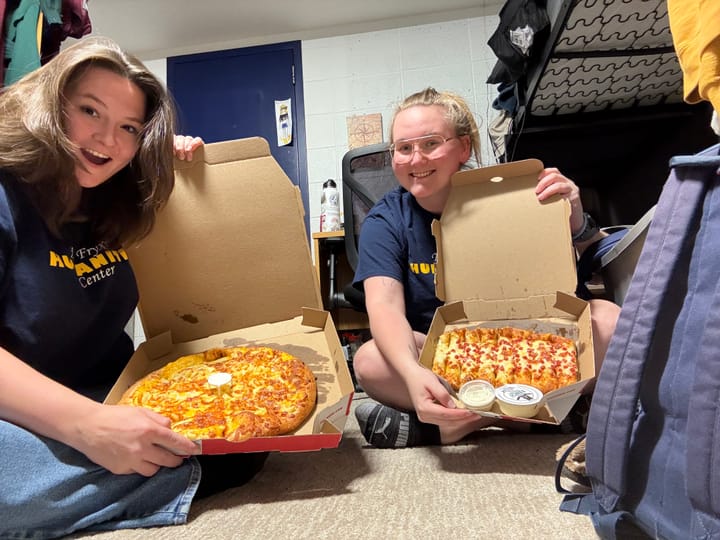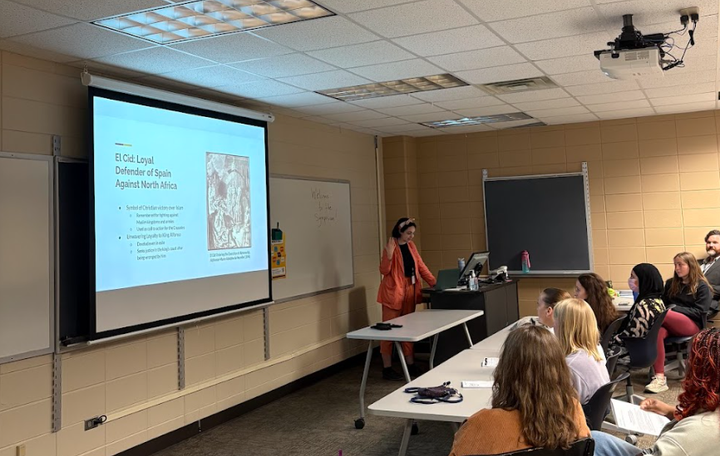Off-campus students deal with off-campus eating
Some people just know what to do in the kitchen. Hand them anything, and they can chop, sauté or boil it to perfection.
Others, when they cook, can only try their best.
“I was trying to make a steak on my own,” said Bodey Behrends, a junior living off-campus. “The heat was on high for so long. By the time five minutes was up, I opened the grill and there was barely any steak left.”
“That didn’t work out so well,” he said.
When college students move off-campus, it can be difficult for them to learn how to cook properly, especially how to cook a healthy meal.
“The worst thing about eating off-campus is that you struggle to eat healthy and not eat out all the time,” Sara Waldner, an off-campus senior, said. “It’s so much easier to just order something than make something.”
Behrends got a few shells in the batter as he was learning how to cook for himself this summer while he was interning at the Sioux Falls Pentagon.
“It was definitely different having to make all my meals,” Behrends said. “When you’re hungry and you’re living on your own, you have to make everything, you have to prepare, and you have to clean everything up. It was hard to find the desire to want to do all that.”
Behrends found that he would eat out for convenience, or throw in a frozen pizza (his go-to meal). But after noticing his expenses add up, he began to change his habits.
“I learned a little bit more about how to eat better,” Behrends said. “I started making more salads for myself, which I never would’ve done usually. [I was] learning how to live on [my] own and becoming an independent person.”
During the school year, he maintains a full meal plan, even though he lives off-campus. Many athletes opt for the unlimited plan in the commons because they are incredibly busy on campus throughout the day.
Other students have only viewed the unlimited meal plan with disdain.
“I grew up cooking for myself,” said Tate Green, a senior. “Freshman year I tried to get out of meal plan and they wouldn’t let me.”
Green wanted to continue cooking her own food in college but was forced to pay for the unlimited meal plan currently required for freshman and sophomores.
Now, Green makes all her meals, and she tries to make them healthy.
On Oct. 18, she baked potatoes and combined them with green beans. No apron, her red hair down to her shoulders, she cut up potatoes in haphazard chunks—about a square inch each—and placed them in a bowl.
“When I got off the meal plan, I dropped a lot of weight,” Green said. “The Commons has a lot of salt and a lot of sugar and a lot of fat in [its food]. When you’re eating it every day, three times a day, it’s not good.”
Green estimated the spices and olive oil as she sprinkles them on the potatoes. She doesn’t need to consult anything. She knows the recipe well. After the oven reached 400 degrees, she popped a pan of potatoes in to bake for 45 minutes.
“Everyone [at Augustana] starts with an unlimited meal plan, which I find ridiculous,” Green said. “When you’re five foot two and 115 pounds, you don’t need a ton of food, which is why I gained weight. I have problems trying to lose that weight.”
Green says eating off-campus has helped her tremendously.
“I find it’s much [easier] to maintain weight when you cook your own food, but it’s much more difficult to maintain weight when you’re on a meal plan,” she said. “[Without a meal plan] you have to make your own meals, so you know what’s going in, but it does take longer.”
About five minutes before the potatoes were done, Green microwaved a bag of green beans. Once both were finished cooking and heating, she combined the potatoes and green beans and separated the portions into different leftover containers.
“I don’t ever just make one serving,” Green says. “I portion it out [and eat more later].”
Senior Lily Noble finds that eating off-campus was key to staying in shape for the track season.
“As an athlete, I feel that if I eat poorly that will affect my ability to practice,” Noble said. “I ate significantly better [once I moved] off campus. People think that eating healthy is too expensive, but I spend [only] $30 a week on groceries like eggs, tuna, oatmeal, frozen vegetables.”
Yet other students lie somewhere in the middle, sometimes struggling to cook and be healthy while eating off-campus.
Senior Rochelle Ramharter said that when she’s really busy, healthy eating is put on the backburner.
“If I am running short on time, I will make some pasta and some sauce because it’s really fast,” Ramharter said.
Ramharter uses a block meal plan so she can stay on campus and eat lunch every day. However, breakfast and dinner are all on her.
“I’m even thinking right now about what I’m going to have for dinner,” Ramharter said. “I think I have some leftovers, so that’s nice.”
Sara Waldner also hailed the power of leftovers.
“Leftovers are amazing,” Waldner said. “I’m so thankful for them. My friend’s parents make us dinner every Sunday and give us their old butter containers and cottage cheese containers [to] take leftovers home. Last Sunday, we made ham and squash. We brought it home and I have been eating ham and squash for the past three days.”
This is a change from last year when Waldner said that she and her roommates would eat out almost every day.
“That was a huge problem last year,” Waldner said. “I feel like we all ate unhealthy and influenced each other to do. We weren’t making progress toward eating healthy.”
Now, Waldner goes grocery shopping every Sunday and only eats out a few times a week.
“For me, it’s just about finding a routine,” she said. “I feel like that’s just part of growing up and becoming an adult on your own. You need to find a routine and stick with it, instead of being like, ‘I want Qdoba or Jimmy John’s.’ [Every time] you eat out it’s $10 a meal, and you don’t have money for that.”
Click to enlarge the photos below.
Senior Sara Waldner makes herself and her roommate Paige Lingbeck burrito bowls with rice, chicken, tomatoes, corn, black beans, lettuce, salsa, cheese and guac. Photos by Grace Douglas.



